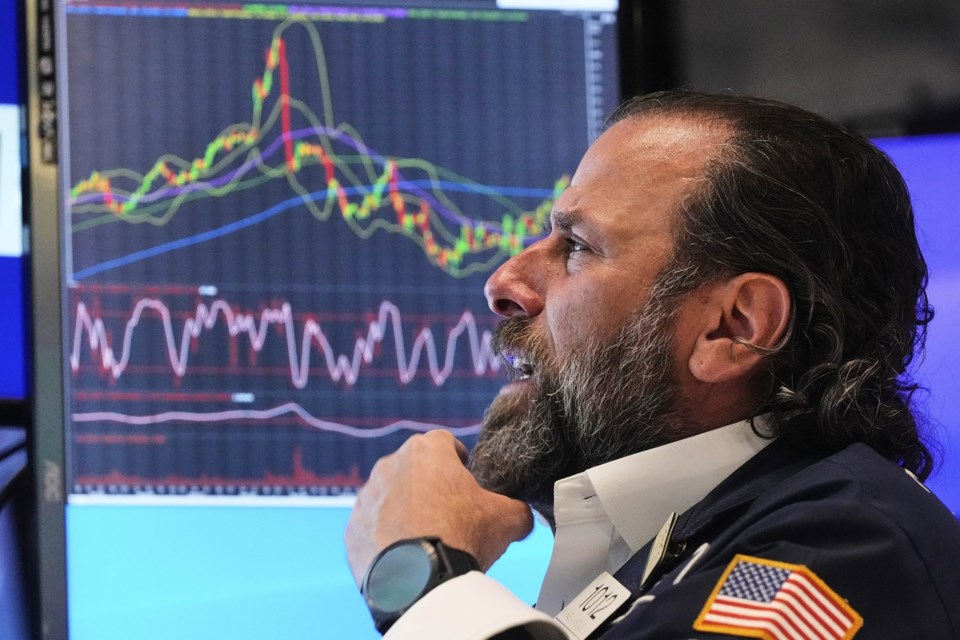NEW YORK (AP) ŌĆö U.S. stocks are holding relatively steady following a report that showed inflation unexpectedly slowed across the country last month. The S&P 500 was little changed early Tuesday. The Dow Jones Industrial Average fell 198 points, or 0.4%, and the Nasdaq composite rose 0.4%. ItŌĆÖs a cooldown following MondayŌĆÖs big leap triggered by a 90-day pause announced in the trade war between the United States and China. Treasury yields also held relatively steady after the U.S. government report showed a slowdown in inflation from March. Economists and analysts say inflation may still run higher in coming months because of President Donald TrumpŌĆÖs tariffs.
THIS IS A BREAKING NEWS UPDATE. APŌĆÖs earlier story follows below.
Wall Street is on track to open with losses Tuesday as the initial euphoria over the in the faded and markets turned their attention to and .
Futures for the S&P 500 slipped 0.2% while futures for the Dow Jones Industrial Average fell 0.6%. Nasdaq futures ticked down just 0.1% ahead of the government's latest report on inflation at the consumer level.
UnitedHealth Group shares tumbled more than 10% after it due to higher-than-expected medical costs. The nationŌĆÖs largest health insurer also announced that CEO Andrew Witty was stepping down for personal reasons and that Chairman Stephen Hemsley will become CEO, effective immediately.
Boeing shares got a small boost on media reports that China had lifted a ban on airlines there taking deliveries of the U.S. aerospace giant's planes. According to reports, China removed those obstacles as part of Monday's trade truce with the U.S. Boeing shares rose close to 2% in premarket trading Tuesday.
Stocks soared Monday after the United States said in a with China that it will cut tariffs on Chinese goods to 30% from as high as 145%, for 90 days.
China, meanwhile, said its tariffs on U.S. goods will fall to 10% from 125%. The agreement allows time for more talks following the weekendŌĆÖs negotiations in Geneva, Switzerland, which the U.S. side said yielded ŌĆ£ .ŌĆØ
The outcome surpassed most expectations, reassuring investors, said Stephen Innes of SPI Asset Management.
ŌĆ£Make no mistake, this was highly stage-managed diplomacy. But the optics are good and the implications real. It signals that even this administration recognizes the economic drag of unrelenting tariffs,ŌĆØ he said in a commentary.
Still, big challenges remain in the negotiations between Beijing and Washington and many countries have yet to negotiate tariff-alleviating deals of their own.
ŌĆ£I think investors are aware that the trade deal is not done yet. ItŌĆÖs not done deal yet," said Louis Wong, director for Phillip Securities Group in Hong Kong. "I would advise investors to remain cautious in the near term and to be prepared for unexpected news from the trade front,ŌĆØ he added.
European markets edged higher, with Germany's DAX and the CAC 40 in Paris each gaining 0.1%. Britain's FTSE 100 was flat.
Beijing's anger over the trade war remained apparent. Speaking to officials from China and Latin America on Tuesday, leader Xi Jinping reiterated China's stance that nobody wins a trade war and that ŌĆ£Bullying or hegemonism only leads to self-isolation.ŌĆØ
Tokyo's Nikkei 225 jumped 1.4% to 38,183.26. Automakers were among the big gainers after the U.S. dollar surged against the Japanese yen. Toyota Motor Corp. gained 3.5% and Suzuki Motor Corp. was 2.4% higher.
Co. added 3% ahead of an announcement that it plans to lay off 20,000 of its workers as part of its restructuring efforts. The automaker said Tuesday that it racked up a loss of 670.9 billion yen ($4.5 billion) in the last fiscal year.
The Kospi in South Korea was nearly unchanged at 2,608.42.
Hong Kong's Hang Seng, which gained 3% a day earlier after Chinese and U.S. officials announced the agreement to pause tariffs and reduce them, fell 1.9% to 23,108.27 on heavy selling of technology shares.
The Shanghai Composite index edged 0.2% higher to 3,374.87 and Taiwan's Taiex jumped 1%.
India's Sensex fell 1.5%.
In Australia, the S&P/ASX 200 climbed 0.4% to 8,2769.00.
In energy trading, U.S. benchmark crude oil added 64 cents to $62.59 per barrel. Brent crude, the international standard, gained 60 cents to $65.56 per barrel.
___
Associated Press video journalist Alice Fung contributed from Hong Kong.
Elaine Kurtenbach And Matt Ott, The Associated Press




